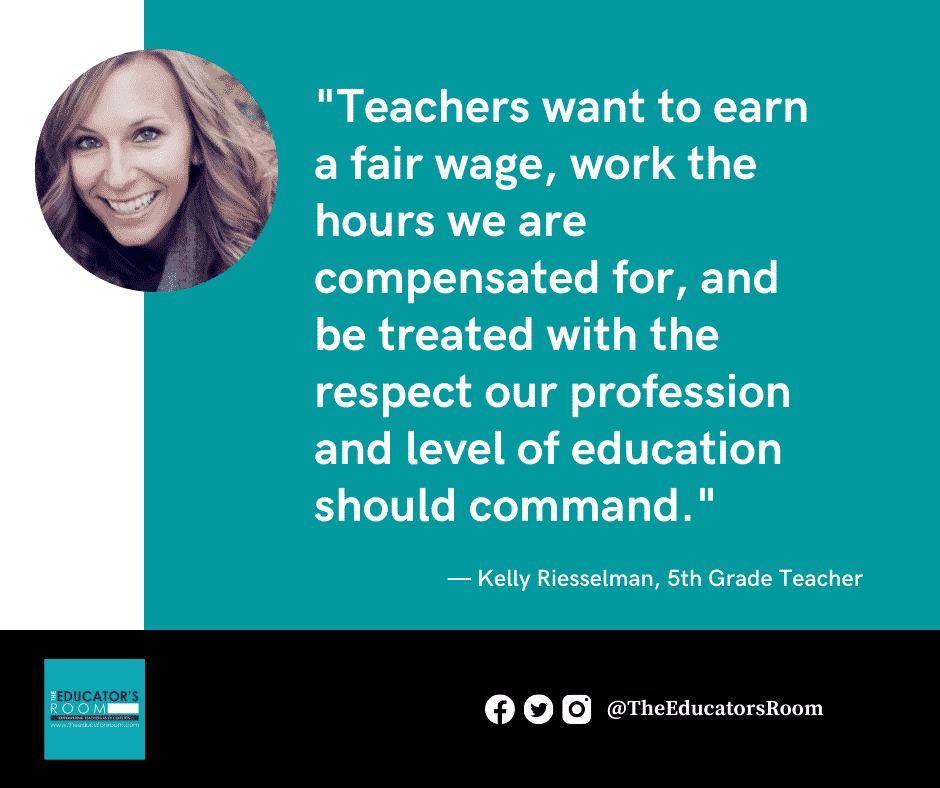
Kelly Riesselman is a 5th-grade reading, writing, and social studies teacher in the Midwest. She holds a bachelor’s degree in English literature and a master’s in elementary education. Kelly’s goal as an educator is to help students learn to see their own self-worth, take responsibility for their own learning, and cultivate a love of learning. She wears many hats in life with the most important being those of wife and mother. As a writer, Kelly strives to create material that has the potential to make a positive impact somewhere in the world.
Throughout my career, I’ve frequently contemplated the origins of the negative stigma that is currently applied to teaching. When did this profession go from being respected and honored to being abused and dismissed? I began my full-time teaching career in my early thirties after I had already married and started a family. I will never forget the first time one of my children called me a teacher during an innocent conversation with her friend’s mother. I should have been proud that I had recently finished my master’s degree and earned my teaching license, but instead, I remember feeling the subconscious need to explain myself. What an odd reaction to a simple, truthful statement.
The sad fact is that there is a dark cloud of disrespect hanging over education and even early in my career, I instinctively knew that I would be dismissed as a professional. Society has demonized the institution of education, along with those who work within. This, in turn, has changed public attitudes and conceptions of teachers over time. For those of us stuck in the middle of the storm, it is no secret that we are held to outrageous expectations that, quite frankly, need to end. If other professions around the country were required to maintain the same standards and expectations as teachers, I suspect the world of education would change quickly. Let’s take a hard look at a few scenarios that apply to teachers, but would be swiftly rejected in any other profession.
I’m not sure about you, but I’ve never heard of a physician running to Target at night, after a long day at the hospital, to stock up on band-aids and ace bandages because supply was getting dangerously low. In fact, these items are not only procured for doctors but are then added to the bills of the patients who use them. Contrastingly, we as teachers regularly use our personal finances to purchase various items that are needed in the classroom. Supplies, activities, snacks for those kids who never bring one…we all know what I’m talking about. If I tried to send a parent a bill for the three expo markers her child purposefully ruined yesterday, I would be not only laughed at but would probably receive a phone call from someone in administration. It’s just not done.
Teachers are also one of the only professions in our paygrade that work well beyond contracted hours on a regular basis. It’s not just what we do, but it has turned into an unwritten expectation for the job. An invisible addition to our lengthy contracts. When do parents feel that it’s more convenient to schedule an IEP meeting after their own working hours have ended? Teachers must comply. Those bi-annual parent-teacher conferences? Let’s have them in the evening after a full day of teaching because it’s convenient for working families. I once had a parent yell at me for calling her cellphone during the day to talk about an incident that happened regarding her child at school. She was appalled that I would dare call during her working hours. This mother raved that if I wanted to speak to her about her own child, I should call back in the evening. Try saying that to a dentist. Can you imagine calling your dentist about getting a cavity repaired and expecting him to come into the office after seven pm in order to accommodate your work schedule? It’s just not done. The unspoken assumption is that public school teachers must meet the needs of all families. Even at the expense of their own. No matter how outrageous the request.
Furthermore, it is frowned upon by society if we view teaching as our job and not our life. Incidentally, this exact phrase was mentioned during an unpaid, new teacher in-service I once attended as a mentor. My new mentee, a first-year teacher, looked absolutely shocked and later asked me what was meant by the statement. What was wrong with considering teaching her job? She was worried that she would be viewed poorly by those around her if she didn’t devote her entire life to the job. Not only is it assumed that we must attend evening meetings, phone calls, conferences, concerts, and family nights, but the expectation is that we should want to donate our time. If we don’t, people conclude that we’re not there for the kids. I think I’ll mention this to my plumber the next time I need him for something. If we were holding the two professions to the same standards, he would not only be expected to fix my leaking faucet in the late evening when it’s convenient for me, but he would do it for free because he loves his job so much that he is willing to donate his time. It sounds absurd when we think about it in that light, doesn’t it?
Teachers want to earn a fair wage, work the hours we are compensated for, and be treated with the respect our profession and level of education should command. This does not make us lackluster teachers or, more importantly, bad people. The irony of the entire conundrum is that many of us would be ready and willing to donate extra time if we felt that it was appreciated and not expected.
The hard truth is that teachers are issued a different rulebook than the rest of the professional world. We all understand our reality, we live it every single day through our interactions with our communities, parents, and the very children we were hired to teach. The attitude of society has rubbed off on many of our students to the point that it is flagrantly waved like a flag in front of our faces through the actions of some of our pupils. The question we should be asking ourselves is: what are we going to do about it? How can we change the perspective of a society that so badly needs a villain? The answer is actually quite simple. We stand together. We unite and speak until our voices are heard. We respectfully disagree with family and friends at Thanksgiving dinner when they make comments about their child’s horrible teacher and the demise of education. We comment politely, but with confidence, on social media posts that poke fun of and abuse our profession. We share the pride we take in the amazing work we do each day with everyone who will listen. We model for the world the amount of professionalism and respect we actually deserve until the world wakes up and recognizes it as well. If we aren’t willing to take a stand for ourselves, nothing is going to change.






